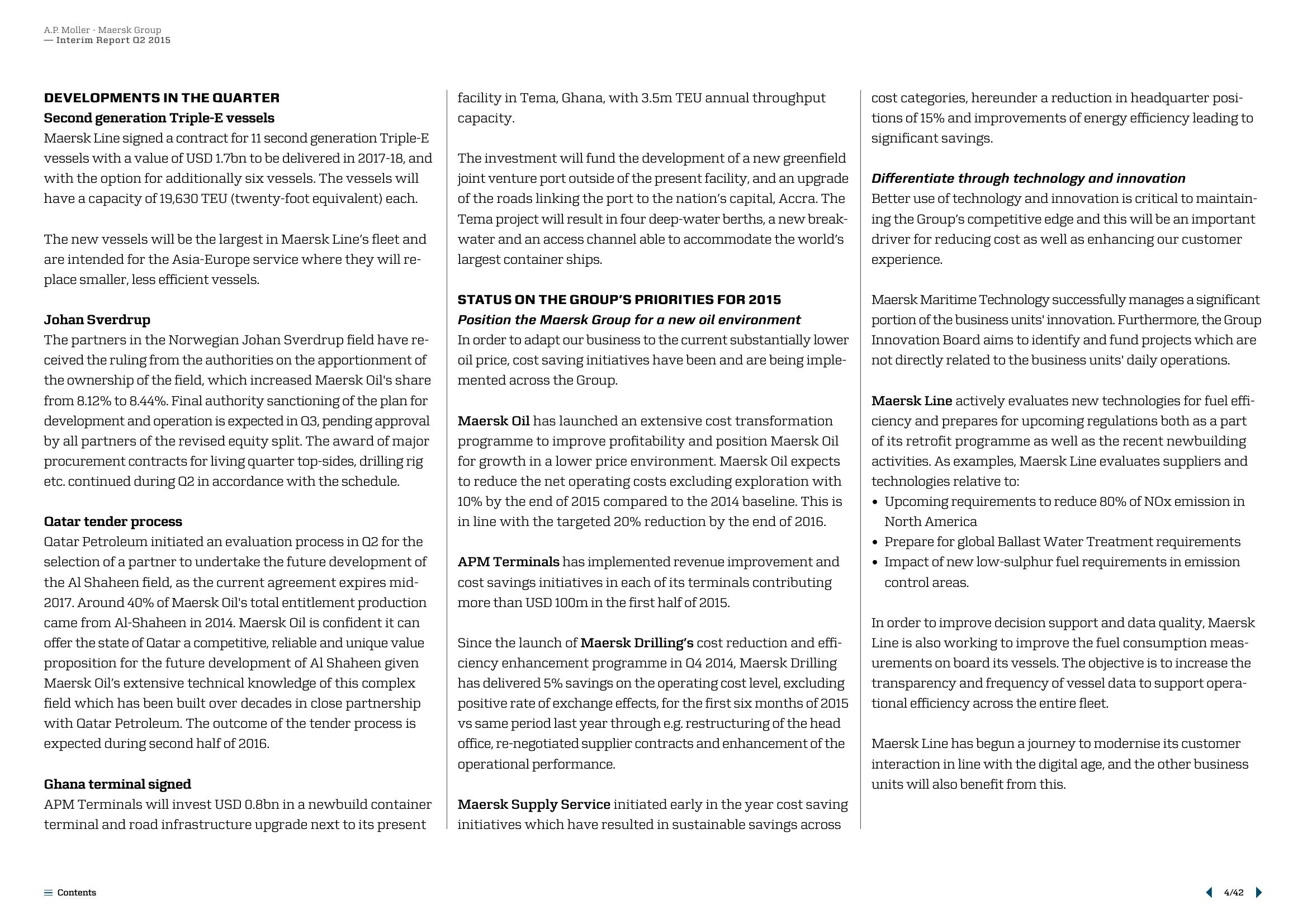Maersk Results Presentation Deck
A.P. Moller Maersk Group
- Interim Report 02 2015
DEVELOPMENTS IN THE QUARTER
Second generation Triple-E vessels
Maersk Line signed a contract for 11 second generation Triple-E
vessels with a value of USD 1.7bn to be delivered in 2017-18, and
with the option for additionally six vessels. The vessels will
have a capacity of 19,630 TEU (twenty-foot equivalent) each.
The new vessels will be the largest in Maersk Line's fleet and
are intended for the Asia-Europe service whe they will re-
place smaller, less efficient vessels.
Johan Sverdrup
The partners in the Norwegian Johan Sverdrup field have re-
ceived the ruling from the authorities on the apportionment of
the ownership of the field, which increased Maersk Oil's share
from 8.12% to 8.44%. Final authority sanctioning of the plan for
development and operation is expected in Q3, pending approval
by all partners of the revised equity split. The award of major
procurement contracts for living quarter top-sides, drilling rig
etc. continued during 02 in accordance with the schedule.
Qatar tender process
Qatar Petroleum initiated an evaluation process in Q2 for the
selection of a partner to undertake the future development of
the Al Shaheen field, as the current agreement expires mid-
2017. Around 40% of Maersk Oil's total entitlement production
came from Al-Shaheen in 2014. Maersk Oil is confident it can
offer the state of Qatar a competitive, reliable and unique value
proposition for the future development of Al Shaheen given
Maersk Oil's extensive technical knowledge of this complex
field which has been built over decades in close partnership
with Qatar Petroleum. The outcome of the tender process is
expected during second half of 2016.
Ghana terminal signed
APM Terminals will invest USD 0.8bn in a newbuild container
terminal and road infrastructure upgrade next to its present
Contents
facility in Tema, Ghana, with 3.5m TEU annual throughput
capacity.
The investment will fund the development of a new greenfield
joint venture port outside of the present facility, and an upgrade
of the roads linking the port to the nation's capital, Accra. The
Tema project will result in four deep-water berths, a new break-
water and an access channel able to accommodate the world's
largest container ships.
STATUS ON THE GROUP'S PRIORITIES FOR 2015
Position the Maersk Group for a new oil environment
In order to adapt our business to the current substantially lower
oil price, cost saving initiatives have been and are being imple-
mented across the Group.
Maersk Oil has launched an extensive cost transformation
programme to improve profitability and position Maersk Oil
for growth in a lower price environment. Maersk Oil expects
to reduce the net operating costs excluding exploration with
10% by the end of 2015 compared to the 2014 baseline. This is
in line with the targeted 20% reduction by the end of 2016.
APM Terminals has implemented revenue improvement and
cost savings initiatives in each of its terminals contributing
more than USD 100m in the first half of 2015.
Since the launch of Maersk Drilling's cost reduction and effi-
ciency enhancement programme in 04 2014, Maersk Drilling
has delivered 5% savings on the operating cost level, excluding
positive rate of exchange effects, for the first six months of 2015
vs same period last year through e.g. restructuring of the head
office, re-negotiated supplier contracts and enhancement of the
operational performance.
Maersk Supply Service initiated early in the year cost saving
initiatives which have resulted in sustainable savings across
cost categories, hereunder a reduction in headquarter posi-
tions of 15% and improvements of energy efficiency leading to
significant savings.
Differentiate through technology and innovation
Better use of technology and innovation is critical to maintain-
ing the Group's competitive edge and this will be an important
driver for reducing cost as well as enhancing our customer
experience.
Maersk Maritime Technology successfully manages a significant
portion of the business units' innovation. Furthermore, the Group
Innovation Board aims to identify and fund projects which are
not directly related to the business units' daily operations.
Maersk Line actively evaluates new technologies for fuel effi-
ciency and prepares for upcoming regulations both as a part
of its retrofit programme as well as the recent newbuilding
activities. As examples, Maersk Line evaluates suppliers and
technologies relative to:
Upcoming requirements to reduce 80% of NOx emission in
North America
Prepare for global Ballast Water Treatment requirements
Impact of new low-sulphur fuel requirements in emission
control areas.
●
●
In order to improve decision support and data quality, Maersk
Line is also working to improve the fuel consumption meas-
urements on board its vessels. The objective is to increase the
transparency and frequency of vessel data to support opera-
tional efficiency across the entire fleet.
Maersk Line has begun a journey to modernise its customer
interaction in line with the digital age, and the other business
units will also benefit from this.
4/42View entire presentation